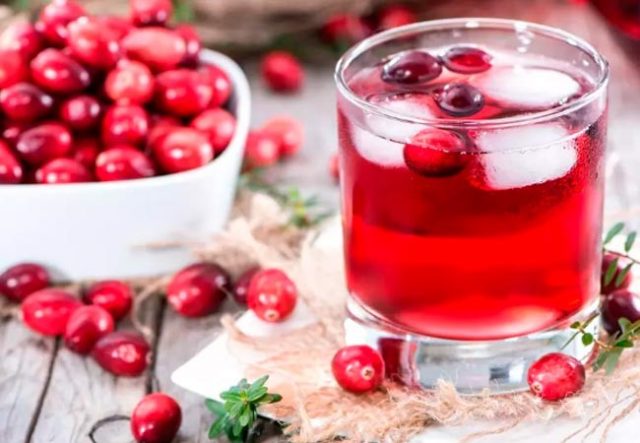Content
Breastfeeding cranberries can provide a nursing mother with a whole group of vitamins, minerals and trace elements. But breastfeeding mothers usually doubt whether cranberries can be consumed if the baby is breastfed. It is believed that those substances that the mother consumes with food pass through the milk to the child. It is considered absolutely correct.
Not all of the chemical composition of foods eaten by a woman will get to the child, but the baby will also receive some of these substances. During the first months of breastfeeding, milk is his only source of all vitamins and minerals.
Is it possible to breastfeed cranberries
Doubts caused by the use of cranberries while breastfeeding are based on the content of a very large amount of ascorbic acid in the product. This substance may cause an allergic reaction in children. But, in addition to ascorbic acid, the berry contains a whole complex of vitamins, minerals and amino acids necessary for the body. Especially if a significant part of all these substances "draws" milk.
"Lost" nutrients need to be replenished. If the baby does not have diathesis after the mother has eaten oranges, strawberries, dogwood and other foods high in ascorbic acid, breastfeeding cranberries is not only possible, but also necessary. But it is best to use it as a different type of drink:
- fruit drink;
- broth;
- infusion.
In addition to nutrients when breastfeeding, the amount of fluid received is also important.
Vitamin composition
The main attention in berries is paid to the content of organic acids, pectins, sugars and vitamins. The sour taste of the berries is given by citric acid, which occupies the main share of the total amount of other acidic compounds. Berries also contain other acids:
- ursolic;
- benzoic;
- chlorogenic;
- cinchona;
- oleic;
- apple;
- α-ketoglutaric;
- γ-hydroxy-α-keto-butyric;
- amber;
- oxalic;
In addition to acids, cranberries contain half of the B vitamins and vitamin K.
Vitamin K is responsible in the body for blood clotting, calcium absorption, and the interaction of calcium with cholecalciferol (D₃). Participates in the synthesis of some proteins. Its deficiency causes profuse bleeding with minor injuries. By the amount of vitamin K, cranberries are not inferior to strawberries and cabbage.
The berry contains B vitamins:
- B₁;
- B₂;
- В₃, he is PP;
- B₅;
- B₆.
This group is responsible for a whole complex of vital body systems:
- the central nervous system;
- gastrointestinal tract;
- cardiovascular system;
- reproductive system.
With a deficiency of B₂, the work of the whole organism is disrupted, since it is also responsible for the work of the endocrine glands.
Of the macronutrients, berries contain:
- potassium in significant quantities;
- calcium;
- phosphorus;
- magnesium.
Potassium affects the work of the heart by strengthening the heart muscle.
Trace elements:
- iron;
- manganese;
- zinc;
- copper;
- chromium;
- molybdenum.
The iron content in berries, which prevents the development of anemia, is quite high.
Of the sugars, cranberries contain fructose, glucose and sucrose. From pectin polysaccharides.
Influence of cranberries on lactation
When breastfeeding, the infant should be getting enough milk so that no additional food is needed. You can increase milk flow by drinking more fluids than during the non-lactation period.Milk contains the most water. In theory, an increase in milk production will occur even if you drink pure water alone. But milk in this case will be "liquid", without enough nutrients. It is much better to increase milk flow with vitamin and mineral cocktails. Cranberry drinks work well for this purpose.
The cranberry itself in the form of a berry is not able to either increase or decrease milk flow. It can only supply the body with the necessary nutrients. But cranberry juice or broth will provide a woman during breastfeeding not only with nutrients, but also with a sufficient amount of liquid. In addition, fruit drink is delicious and you can drink it even when you don't feel like drinking. This use of additional liquid in the form of berry drinks will significantly increase milk flow and at the same time will not make the milk "empty".
How to make fruit drink
Fruit drink - juice diluted with water. In the case of cranberries, the preparation of a drink is similar to the preparation of an infusion and differs only in the concentration of the final product. To prepare fruit drink, you need 2 glasses of berries and 1 glass of water. The berries are kneaded and poured with hot, but not boiling water. Insist for about 15 minutes. After that, the resulting fruit drink is filtered and the pulp is squeezed out. Add sugar or honey to taste. If the concentration is too high, the fruit drink is additionally diluted with water.
When can cranberries be added to the diet of HS
If a woman consumed cranberries during pregnancy, then this process can be continued while breastfeeding. It is necessary to monitor an allergic reaction in an infant, but he will give it out to other similar products.
If earlier this berry was not in the diet, it should be introduced, like all new products, gradually. When breastfeeding, the baby gets some of the nutrients, not everything that was eaten by the mother. Therefore, it is pointless to start eating cranberries with 1-2 berries. You can limit yourself to half a glass of fruit drink for the first time.
Contraindications to the use of berries and products from them are common diseases. These diseases have nothing to do with either breastfeeding or the sex of the person. If the mother has problems with the gastrointestinal tract, cranberries are contraindicated for her, regardless of whether the child is breastfed or has already grown up.
Cranberry juice or berries should not be consumed if you have the following diseases:
- heartburn;
- stomach ulcer;
- duodenal ulcer;
- gastritis;
- increased acidity;
- liver diseases.
Problems after drinking fruit drink will not be with the child, but with his mother.
Is it possible to use cranberry juice while breastfeeding
If a mother can eat berries even from the first day after giving birth, then there are no restrictions for fruit drinks. If we are talking about a baby who is fed with breast milk, then the data on when he can be given cranberry juice varies. It depends not on objective indicators, but on what kind of feeding system the mother adheres to.
Some people think that the baby should be breastfed up to 1.5-3 years. Naturally, at this time the child does not have enough milk and he eats other food, including drinking cranberry juice. For young infants, fruit drink is introduced into the diet in the same way as other juices and at the same time. Start with a small amount of the drink diluted with water.
Conclusion
Breastfeeding cranberries are a good substitute for southern citrus fruits. Since essential oils often cause allergies when eating citrus fruits, cranberries will help fill the lack of nutrients when feeding a baby with breast milk without consequences for the baby.















